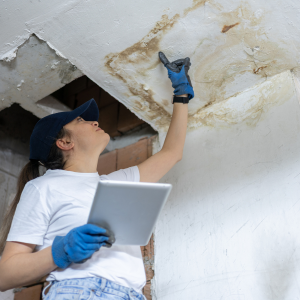
Maryland homeowners whose homes have been damaged by water may find it challenging to sell, but they can do so if they know what to do. There may be small leaks or big floods in your home. You need to know how to show off its best features and calm buyers’ fears at the same time. Homeowners who want to sell their damaged homes can assess the extent of the damage, make the necessary repairs, and explore the best market opportunities to maximize their return on investment. Direct MD Cash Buyers can help simplify the process by purchasing homes as-is, offering fair cash offers, and ensuring a quick and stress-free sale. Knowing what to do and what to consider will help you secure a fair deal, even in the face of water damage, as this guide explains.
Understanding Water Damage in Maryland Homes
Maryland’s weather and landscape are quite different, which makes it challenging to repair water damage in homes. People in Baltimore who want to sell their homes need to understand what causes this issue and how to identify it. Not only does knowing these things help repair damage that has already occurred, but they are also very important when discussing the house with potential buyers. To protect your Maryland home and make it easier to sell, it’s essential to understand where water damage typically originates and how to identify the initial signs of it.
Common Causes of Water Damage
Water can cause damage to homes in many areas of Maryland. Mostly, it’s due to bad weather and old homes. When it rains, cities with old infrastructure often struggle to handle large amounts of water. The water starts to fill up and rise after that. People who aren’t careful can also cause water problems. A lot of damage can be caused when things break or leak, such as when water lines freeze in the winter. Maryland is situated near a significant amount of water, which increases the likelihood of homes flooding. When people don’t take care of their roofs or when the rain breaks them, they leak. This area can develop mold, which is detrimental to both your health and your home. To take care of your home, follow these tips. This will keep you safe and maintain your home’s value.
Signs of Water Damage to Look For
That way, you can maintain your home’s value and ensure the sale proceeds smoothly in Maryland, especially in Baltimore. Find water damage quickly. The roof and walls may have brown or yellow spots. For the most part, these marks indicate that past leaks were not properly addressed or overlooked. White, chalky salt layers called efflorescence can form on concrete or brick. This is a sign of water damage, especially in foundations and basements. If you see mold or smell a musty odor, it means that water has been present in the air for an extended period. This might be bad for your health and make your house look worse. Broken bases, walls that shift, and sagging floors can all be signs of significant water damage and structural issues. At the same time, people should ensure that their doors and windows have secure locks to prevent water from entering. Additionally, if their water bills increase rapidly, it could indicate the presence of leaks they are unaware of. If you recognize these signs, you can get repairs done faster, provide buyers with more useful information, and increase the value of your home in Maryland’s housing market.
Types of Water Damage and Their Impact on Selling in Maryland

Some factors may make it more challenging to sell a Maryland home that has been damaged by water. What you do will depend on the type and amount of water damage. How people perceive your car and how you sell it can be significantly influenced by your ability to distinguish between body damage and paint damage. However, people selling their homes in Baltimore should be aware that damage like this can lower the value of their homes and deter potential buyers. Think about cash deals and how fast you can sell. Both are important for creating a realistic plan for selling.
Structural Damage vs. Superficial Water Damage
If you want to sell a Maryland home that has been damaged by water, it’s essential to understand the distinction between interior and exterior damage. Water that has been in the house for an extended period often exhibits this behavior. This weakens the supports, load-bearing walls, or foundation of the house. We refer to this as building damage. Much of this trouble occurs in older homes in Baltimore. When selling a home that needs repairs, this type of damage needs to be addressed immediately, and owners may be wary of problems or fixes that are costly or require urgent attention. The price and the talks might change a lot because of this. Damage to the surface of the house, such as spots, bubbling paint, or warped finishes, mostly affects its appearance. People might still not buy if this damage isn’t fixed.
If someone is selling their home, they should address any known water damage and inform the buyer about it. This will ensure fairness and prevent fights. Addressing small issues promptly can preserve the house’s value and foster buyer trust. Disclosures, short sales, and quick cash sales don’t have to make it harder to sell your house. Real estate managers or lawyers can help you through them. Ultimately, buyers can select the most suitable method for selling their home by being transparent about the extent of the damage. This is true whether they want to fix it up for a normal sale or go for a quick cash deal.
Effects on Property Value and Buyer Interest
There are numerous homes for sale in Baltimore, Maryland. Water damage can reduce a house’s value and make it less appealing to potential buyers. The price and time it takes to sell depend on the extent of the damage. When a house requires extensive repairs, people tend to pay less for it because they perceive it as a risk and anticipate high costs to make the necessary fixes. Most people are unable to get in due to this. Individuals who want to sell their home may look for investor home buyers in Baltimore, MD, or buyers who are ready to purchase it with cash. This helps the sale proceed more quickly and prevents buyers from incurring significant expenses on repairs. Maryland law requires that all signs of water damage be disclosed. People are more likely to believe you if you are honest and truthful. Being honest will also help you avoid legal trouble. People can make informed decisions if you provide them with all the necessary information about the damage and repairs. You might want to be cautious and wait, or you might see an opportunity to buy a house that will appreciate in value. If the seller knows that water damage reduces the value of their house, they can either repair it to make it more appealing or sell it for cash. People might also be interested if you explain what makes it special and clearly define the terms. This could help the sale go more quickly and easily.
Steps to Prepare a Water-Damaged House for Sale in Maryland
There needs to be a plan to sell a Maryland house that has been damaged by water and keep its value. An in-depth review by a professional is the only way to determine the extent of the water damage and identify what needs to be repaired. For people who want to buy a house, they can either fix all the issues or consider selling it as is. Whether you want to sell your home for cash in Maryland or through a real estate service, these steps will help you attract more potential buyers. This is what the law in Maryland requires to expedite the sale process.
Professional Inspection and Assessment
If water has damaged your home, it is recommended that you hire professionals to inspect it and determine the extent of the damage. Mold, an unstable foundation, and leaks that were not visible are just a few of the problems that are discovered during a comprehensive inspection. It helps you set a fair price for a Maryland home that has been damaged by water and ensures you follow the state’s disclosure rules. Experts use high-tech tools to locate wet spots that could compromise the building’s integrity behind walls, under floors, and in other hard-to-reach areas. When people buy something, their thorough report gives them useful information. This builds trust and honesty, which is especially important in places like Baltimore, where bad weather often causes water damage. In Maryland’s competitive market, a thorough review also helps sellers determine whether to renovate the house or sell it as-is. This helps them decide what to do based on their time and money goals. With the help of a professional, buyers can choose whether to renovate the house to make it more appealing or market its potential to investors. Repairs that comply with the local building regulations are also reviewed during inspections. The house is worth more and can be sold faster to people who want to move in right away.

Repair, Remediation, or Selling As-Is in Maryland
People who own homes need to seek professional advice on whether they should repair the damage and restore the house to its original condition or sell the house as is without inspection. The market will be significantly different after this ruling, especially in Maryland, where real estate is particularly distinct. A house can sell for more money and attract more buyers, even those who aren’t sure if they want to buy it as-is. This is because fixing things like foundations or changing drywall can yield a higher return on investment. For the most part, a house that has been renovated costs more and looks ready to move into right away. However, landlords or buyers who plan to make some changes might be interested in buying the house as it is. People who are looking for homes that need work are likely to be searching in markets that move quickly, such as Baltimore. This choice can speed up the sale. However, most of the time, it means lowering the price to represent the actual cost of repair. If the seller doesn’t have much time or money, this might be a better choice. Ultimately, the choice should be based on the cost of repairs, the time required, and your desired selling timeframe. Buyers can make informed choices and make their plans work more effectively when they consult with real estate agents who are well-versed in the Maryland market.
Legal Obligations and Disclosure Requirements in Maryland
You need to know the rules and what to say if you want to sell a house in Maryland that has water damage. Being open and honest is crucial for both sellers and potential buyers. The law in this state says so. This means being honest about any water damage that has occurred or is currently happening. Most of the time, following these laws is the best way to keep buyers’ trust and close a deal. Next, we’ll discuss how to inform buyers about water damage and why it’s essential to be honest when selling a house. If you’re preparing to sell and need helpful tips or guidance along the way, please don’t hesitate to contact us anytime. We’re happy to lend a hand!
How to Disclose Water Damage to Potential Buyers
People who want to buy your Maryland home should be aware of any existing water damage if you plan to sell it. Being open and honest is the right thing to do. It also fosters trust and prevents conflicts from arising. Maryland law requires sellers to disclose any known defects, including those caused by water damage, to buyers. Write down all the bad things that have happened because of the water to make sure you’re telling the truth. You should list both the visible damage, such as dents or spots on the floor, and the invisible problems, like mold or cracks in the foundation. They can help you set a fair price for your home and ensure that the information you provide in your disclosure documents is accurate. If someone wants to buy a house, they will know its true condition if they are aware of any past or present water damage.
How you share this information is just as important. Not only should you write down the damage, but also what was done to fix it or make it safer, such as installing additional insulation or improving the drainage system. A contractor’s report is a good way to build trust and demonstrate that the house has been well-maintained. The customer should be able to ask questions and be informed about changes that will improve things. Being honest about a property is the right thing to do. Additionally, being honest can help people trust you, which can make the sale proceed more smoothly in Maryland’s challenging market.
Strategies for Successfully Selling a Water-Damaged Home in Maryland
There is water damage in your Maryland home. To sell it, you need to make it look better so people will be willing to take a chance. To move forward, you need to learn how the market works, set the right prices, and improve your marketing plans. Determine the type and extent of water damage before deciding on a course of action. This will change the price talks and make the customer less likely to trust you. You should follow the law and provide all the information requested. Make specific plans for how you will fix up the house or decide to sell it as-is. This will also speed up the process. It’s possible to still get good deals even when things aren’t going well. Let’s explore the best ways to set prices and sell your products.
Pricing and Marketing Tactics

To successfully sell a water-damaged home in Maryland, it is essential to be strategic in pricing and marketing it. This is particularly true in Baltimore, where intense market competition exists. Based on the current damage and market conditions, a fair price should be established. That’s the first step. In Maryland, there are trained professionals who can help you determine the value of your house, taking into account factors such as mold or foundation issues. Additionally, you need to persuade people to buy and recoup the money you lost. If you make or fix changes to a house, such as repairing the pipes or waterproofing the basement, it can look better. Demonstrating honesty and taking care of your property regularly will make people more likely to trust you. You can do this by showing them inspection records or certifications.
It’s not just about price to get the right people; good marketing is also important. An honest listing should accurately describe the house and highlight its positive aspects, such as its location, nearby amenities, and the potential for renovation. More people will be able to find your business if it is listed on multiple sites, features high-quality pictures, and offers video tours. You can reach buyers and people looking for houses that need work through real estate websites, social media, and local property groups. This may get more people interested. To encourage people to buy from you, consider offering incentives such as home warranties or repair credits. Sellers in Maryland can be sure that their home will be priced correctly, marketed effectively, and communicate more easily if they work with an experienced real estate agent. This helps people sell their homes even when there are issues, such as water damage.
Need to sell a water-damaged house fast? Skip the repairs and stress. Direct MD Cash Buyers offers fair cash deals and a smooth, hassle-free sale. Call (443) 391-7080 today for your no-obligation offer and get started now!
FAQs:
What are the common causes of water damage in Maryland homes?
Water damage in Maryland homes can result from heavy rainfall, aged sewer systems, burst pipes during cold winters, faulty appliances, and coastal flooding. Roof leaks, often due to poor maintenance or storm damage, are also common causes.
How can homeowners identify early signs of water damage?
Early signs of water damage include stains on ceilings or walls, efflorescence on concrete surfaces, moldy or musty odors, warped floors, foundation cracks, and increasing water bills, which may indicate hidden leaks.
What should homeowners consider when deciding between repairing water damage or selling as-is?
Homeowners should consider repair costs, time constraints, and desired speed of sale. Repairing damage can attract more buyers and increase the sales price, whereas selling as-is may appeal to investors or those seeking renovation projects.
What are the legal obligations for disclosing water damage when selling a home in Maryland?
Sellers in Maryland are required to disclose any known defects, including water damage, in order to comply with state laws. Transparently communicating both past and resolved issues helps maintain buyer trust and fulfills legal obligations.
What marketing strategies can help sell a water-damaged home in Maryland?
Effective marketing includes transparent listings, emphasizing location benefits, offering virtual tours, and providing repair documentation. Targeting niche buyers, such as investors, and offering incentives can also attract interest.
Helpful Maryland Blog Articles
- Selling A Probate House In Maryland
- How Long After an Appraisal Can You Close in Maryland?
- Selling a House with Mold in Maryland
- How Do You Get Rid of Squatters in Maryland?
- Can You Sell a House with a Lien in Maryland?
- How to Negotiate Repairs After a Home Inspection in Maryland
- Selling a House with Foundation Problems in Maryland
- Capital Gains Tax After Selling a House in Maryland
- How to Sell an Investment Property in Maryland
- How to Sell a House With Title Issues in Maryland
- Sell House with Water Damage in Maryland
- How to Sell a Hoarder House in Maryland
- Homeowners Insurance When Selling a House in Maryland
- Do I Need a Lawyer to Sell My House in Maryland?

